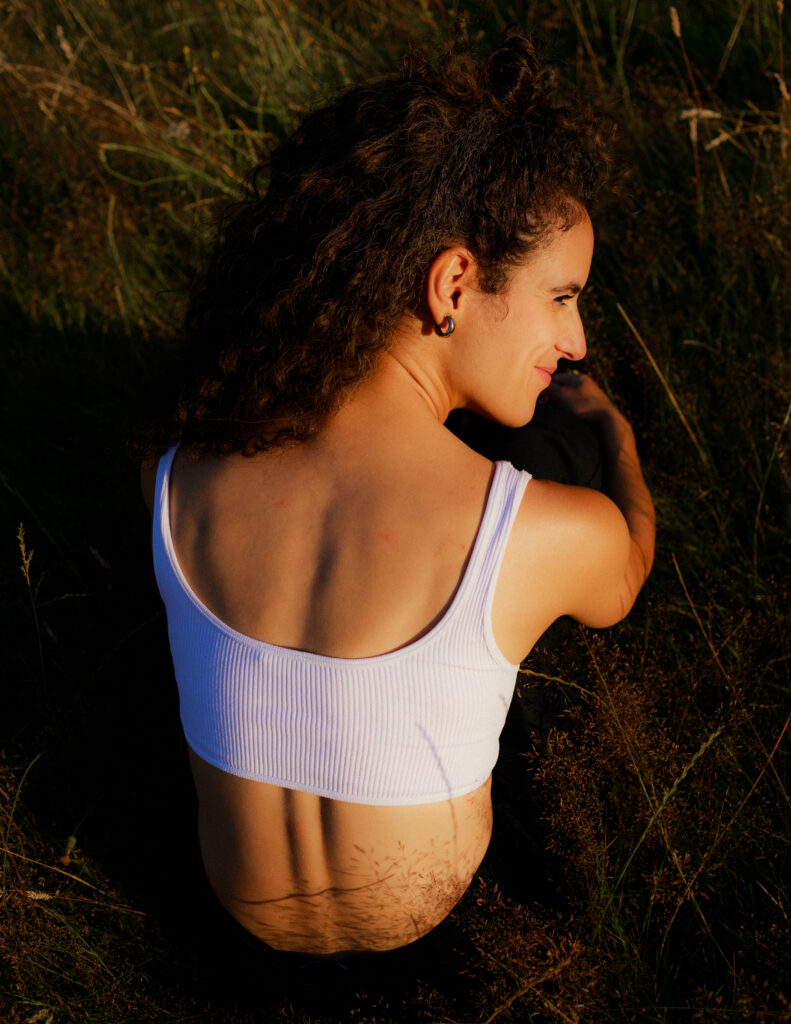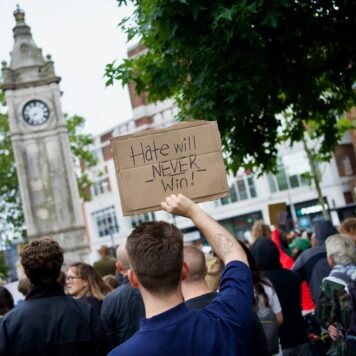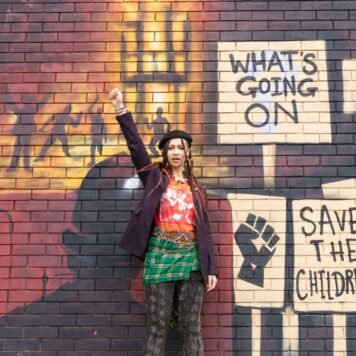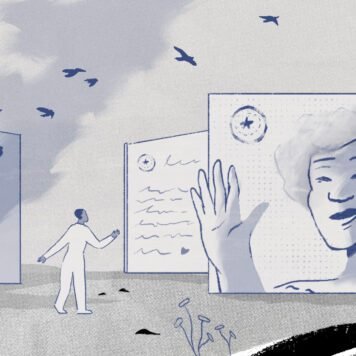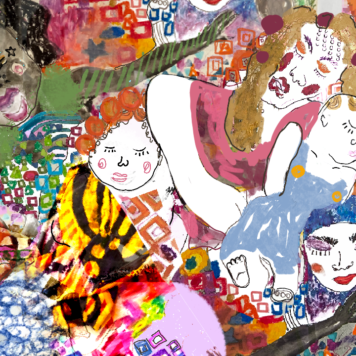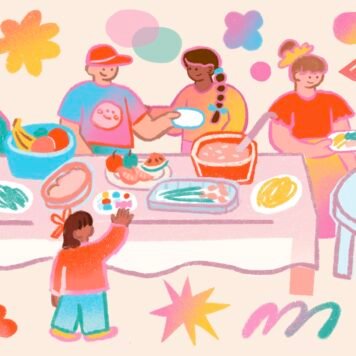We all know that the story we are popularly told about the linear waves of feminism is reductionist, often depicting the struggles of Black women and women of colour, queer women and disabled women at the margins – if at all. But how often do we consider that it is also obscuring the unsavoury underbelly of the feminist movement itself?
With its revelatory history lesson about feminism, Leah Cowan’s latest book Why would feminists trust the police? adds new insights to well-known histories, and shines a light on lesser known tales of the British feminist movement.
Leah and I jumped on a Zoom call to discuss the book just before it officially launched, and I could feel the anticipation of its imminent release – even through the screen. Like most authors before a book launch, Leah seemed to be in that reflective mode and her answers were all so well thought through. Importantly, not in the ‘politician’s pre-prepared jargon’ sense; in the natural, reflective, ‘this knowledge has been built up through extensive research and community organising’ kind of way. So, early on I knew there’d be mic drop moments. Trust me, keep reading!

The extent of Leah’s research is blatant throughout the book’s storytelling. She maps the complexities of feminist histories in the UK, and believes that knowing the foundations of the movement can help us better understand fractures among its factions today. “When I’ve talked about the fact that the first women police officers in the early 1900s were former suffragettes, I think that is a bit of a lightbulb moment for people to realise there is a link here,” she says.
Continuing on, she says that “some of them became fascists and joined the British Union of Fascists. And there’s a very short step between suffragette organising and police and fascism. I think that shocks people.”
She is matter of fact in saying so, because that’s exactly what it is – fact. British feminism, policing and fascism have always been intertwined. It’s a fact I’ve known in the back of my head, but have buried somewhere in the compartmentalisation of it all that comes with navigating Black womanhood in the UK. It’s a hard pill to swallow: the movement we so deeply rely on today in the face of rising fascism, transphobia and gendered Islamophobia has rotten foundations. Though, I’m taking what Leah describes to me as “the drumbeat throughout the book” – we need to face up to this history in order to move forward.
Zooming through to more recent history, the book also captures how this has been challenged by liberation-oriented feminist organisers. Leah celebrates the Black and South Asian women arriving in the UK in the 1960s and 70s who brought with them knowledge of how to organise at the nexus of feminism, workplace unionising and anti-colonial struggle. From the 1974 Imperial Typewriters strike in Leicester led by South Asian women, to the Black Parents’ Movement’s solidarity networks with trade unions across Africa and the Caribbean, Leah demonstrates how Black and South Asian women at the intersection of these struggles drew on their connection into multiple movements – locally and globally – as a vehicle for building power.
She also distils the complex into the comprehensible, namely with the language she uses – including creating a whole new* term. Exploring how feminists’ radical, care-focused, survivor-centred response to violence has been co-opted, policed and neutralised by the gender-based violence sector, Leah uses the term sectorification.
*Well, we think it’s new! Our discussion of that went like this:
LK: “Sectorification. Did you coin this term?”
Leah Cowan: “I don’t know, but let’s just say that I did!”
LK: “Yeah, I’m down to say that you did!”
So, there you have it, a whole new term – we believe!
White Supremacy and the construction of criminality
The relationship between feminism and policing is also marked by the historical role white womanhood has played in criminalising Black noise and Black joy. In the book, Leah touches on how white women have long policed the parameters of ‘civility’ – shapeshifting the boundary lines of what is considered criminal at the whim of white supremacy.
She expands on this when we speak. “The types of activities that they [white women in positions of power] deem illegal are going to be things that pose a threat to their interests, their wealth, their power, their worldview.” It feels timely to be engaging with these histories when their legacies are so visible today. Over the past year, new so-called Public Safety Protection Orders have been rolled out in Croydon, Lewisham, and other parts of London, some of which detail noise in public space as a mandate for additional police powers. The dog whistle is loud!


Going on to speak about how queer joy, and Black queer joy, have been policed, Leah adds: “we can also think about the criminalisation of homosexuality in an era when gay people were understood as posing a threat to the productive configuration of family units, who were going to contribute to the economy, and uphold racial capitalism in a particular way.”
Whilst still criminal in 64 countries around the world, elsewhere racial capitalism has found a way to make Pride profitable, with corporations’ pinkwashing efforts hoping to conceal their warmongering, polluting, and other harmful ends. The recent boycott of National Student Pride due to its sponsors’ ties to Israeli arms companies is case in point.
The Catch 22 of categorising who is and isn’t a feminist
As well as traversing this connectivity between oppressive forces that feminist movements – past and present – have contended with, this book is also directing our thoughts and efforts, away from fruitless dialogue and towards the work.
We’ve all seen it: when even the most committed organisers get caught up in the conflict-fuelled vicious cycle of social media debates about who defines feminism, and claiming that those not fully committed to liberation are ‘not feminists’. Summing up the book’s message in one sentence, Leah explains that “this pursuit of trying to categorise who is and isn’t feminist is a bit of a misdirection.”
Subscribe to shado's weekly newsletter
Exclusive event news, job and creative opportunities, first access to tickets and – just in case you missed them – our picks of the week, from inside shado and out.

Throughout history, there have been fascists, racists, police officers, homophobes, transphobes, ableist, anti-immigrant individuals who consider themselves feminists. We don’t reclaim feminism by getting ahistorical in hindsight, or disputing the boundary lines of who can, and cannot, call themselves a feminist – this is a waste of time.
Toni Morrison’s words “the very serious function of racism is distraction” come to mind. Leah is adamant that, in doing the work – the serious work of organising in community – we define feminism for ourselves. Though, on a practical note, she does advise that when joining groups we take more note of their political activity than how they label themselves to differentiate between the schools of thought.
In a political climate where we see the language of liberation movements co-opted, diluted or used vacuously, it’s incredibly important to be diligent about the work we pour into, and how it is contributing to truly transformative change that grasps at the root of oppression, rather than tinkering at the edges.
The revolution will not be funded by Trusts and Foundations
These kinds of practical reflections on how we build an abolitionist feminist movement, and how we win, are a welcome constant throughout this book. I found myself nodding along, sometimes letting out an audible ‘mmm’ in agreement, or deep thought. The only moment throughout the book’s 200-ish pages that I felt otherwise for a split second was reading the section about how we fund our movements.
Leah writes about the power of community fundraising, referencing the £1.2 million in donations to Black Lives Matter UK (UKBLM) in 2020. “It’s very heartening that [UKBLM] got a massive injection of money from people within our community, and allies,” she says. “It was the biggest grant giving process to Black organisations ever in British history.”


It’s true that it was a staggering amount, and I’ve been so glad to see how powerfully it has been shared among a number of grassroots Black liberation organisations. My feeling of slight reticence to upholding this as a model of fundraising we can apply going forward comes from the context. These donations were the product of a wave of reckoning that came in the wake of the awful murder of George Floyd. So, I had to put forward a friendly challenge about the limitations of waiting for moments of tragedy and white guilt to fund necessary community work.
Leah warmly welcomed the challenge – the sign of a true thinker and community organiser – she agreed, and, after a pause, spoke about the need to use resources intentionally to strengthen our movement’s foundations, in preparation for moments with fewer funds. She reflected that seasons of injected resources allow movements to “build capacity and build the base of our organisations, to build communities and bring people in, so that even when that money is spent, we’re in a much stronger position than we were before.” Since going to BLM UK’s Festival of Collective Liberation recently, I can see that she’s right – resources from 2020 are still being used to grow and sustain the movement today.
Stepping stones towards abolitionist futures
So, we have a picture of how we fund existing work, but, for those starting out – where does Leah suggest you start?
She is positive that humble beginnings can be a stepping stone towards building this future. I could hear the hopeful cadence in her voice, when she said that, when we show care for one another in our day to day encounters, we demonstrate that we don’t need to resort to policing.
To give an example, Leah explains, “if you know your neighbour, and you’re like, ‘sorry I’m just trying to get some sleep, would you mind turning music down?’ that’s going to go down very differently if that’s your first interaction with them, but if you have a long history of getting birthday cards, or building a bit of a connection with somebody, those interactions go much more smoothly. They’re not going to escalate to a position where somebody’s going to be like, ‘I’m going to call the police’ because they can’t think of anything else to do.”


From neighbourly chat, to the camaraderie of our organising spaces, it is through connection and community that liberation-oriented feminist movements have won, and will win. Why would feminists trust the police? is soul-baring in retelling the reality of conflict within the feminist movement in the UK, depicting exactly why abolitionist feminists don’t trust policing to save us. It does so, not only to change our understanding of the past, but to take off rose-tinted glasses in the present, and shape our vision for abolitionist feminist futures – compelling us to get organised.
What can you do?
Read!
Books:
- Why Would Feminists Trust the Police? By Leah Cowan
- Abolition. Feminism. Now. by Angela Y. Davis, Gina Dent, Erica Meiners, and Beth Richie
- Become Ungovernable : An Abolition Feminist Ethic for Democratic Living by H.L.T. Quan
- Abolition Revolution by Aviah Sarah Day and Shanice Octavia McBean
Articles:
- Abolition Feminism is the only solution for the criminalisation of gender-violence survivors by Marcela Onyango
- What is Abolition? By Sara Bafo
Listen!
- shado-lite podcast episode: How do we make ourselves and our community ungovernable? With guest Dr Aviah Sarah Day
- Surviving Society podcast episode 161: Abolition Feminism with Nikki Godden-Rasul, Tina Sikka & Alison Phipps
Get involved!
- Join an Abolitionist Futures reading group
- Find your local Cop Watch
